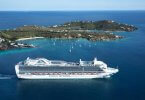By James Shillinglaw, Dec 07, 2021
With the rise of the Omicron variant of the COVID virus, destinations are scrambling to react, imposing new protocols or adapting to make it easier for U.S. travelers to visit. Here’s what three countries—Jamaica, Bermuda and Chile— are doing to meet new one-day testing requirements for travelers entering the U.S. that went into effect Dec. 6 and also introduce new protocols to help counter the Omicron variant of the COVID virus.
Jamaica: Jamaica says it is well-prepared to meet the newly announced one-day testing requirement of the U.S. government and assist both international travelers returning home as well as Jamaicans visiting the U.S., effective Dec. 6, 2021.
Jamaica has established ample testing locations throughout the island with both antigen and PCR tests available. In addition to multiple lab facilities and testing capability at both its Montego Bay and Kingston airports, many of the island’s resorts and hotels offer approved testing services on property, making the departure process even more seamless.
Perhaps most important for travelers, Jamaica offers pre-booking for return tests to ensure results are provided in time to meet departure needs. Jamaica already has an established partnership with three approved private laboratories to provide travelers with seamless in-hotel antigen or PCR tests. Tests can be easily scheduled in advance – even prior to a traveler’s arrival on island – through each lab’s dedicated online booking platform at Get Well Labs, TSL and Hospiten.
Both international airports in Jamaica are equipped with pre-flight testing capability prior to check-in. For travelers opting for in-airport testing, they can book their appointment online and arrive at the airport a minimum of three hours in advance of their flight to obtain their required departure result.
Visitors staying at licensed hotels, resorts, villas, guest houses or residences can schedule their test to be performed on property via a convenient concierge service, or book an in-person appointment at the closest laboratory location. All certified lab locations can be found on www.visitjamaica.com.
The health and safety of every Jamaican and every visitor to the country remains the country’s top priority through its comprehensive Jamaica CARES protocols. These protocols were among the first to receive the World Travel & Tourism Council’s Safe Travels recognition and allowed the island to safely reopen in June 2020. Since that time, we have welcomed over one million visitors. The protocols continue to prove effective, especially within the Resilient Corridors, which cover more than 85 percent of the island’s tourism product and include less than one percent of its population. Jamaica has recorded a COVID-19 infection rate of under one percent within the Resilient Corridors over the past year. For more information, call 800-526-2422 or visit www.visitjamaica.com.
Bermuda: The Bermuda Tourism Authority is welcoming the first significant loosening of COVID-19 border protocols since the island reopened in July 2020. Rapid antigen testing has been added as an approved option for pre-arrival testing of vaccinated Bermuda-bound travelers effective Dec. 3, 2021.
Bermuda will require that the rapid antigen tests be observed and certified by a laboratory, health care entity or telehealth service for negative results to be valid for travel to Bermuda. Improved technology, shortened results windows, and widespread availability of rapid antigen tests are expected to simplify the pre-arrival planning process for prospective travelers, making it a safe and convenient option for visitors.
Bermuda Tourism Authority CEO Charles H. Jeffers II said, “The shift in protocols is welcome news for Bermuda visitors. With increased vaccination uptake in our key markets, vacation-starved travelers have been shopping for their next destination. This move by the Bermuda Government puts us in a stronger market position as we compete with rival destinations touting less stringent travel requirements. To ensure that we remain a viable and attractive destination for our cruise and airline partners, we must demonstrate that our health and safety protocols meet consumer demand for a safe, streamlined travel experience from beginning to end.”
Vaccinated visitors represent less than one percent of those testing positive in Bermuda (on arrival or post-arrival). In a move that reflects the low risk posed by vaccinated travellers to the island, the Ministry of Health has announced that those visiting Bermuda for seven days or less will not be required to undergo follow-up testing while on-island. The Bermuda Government will facilitate outbound testing for visitors according to the requirements of their return destination. All travelers to Bermuda are still required to undergo a PCR test upon arrival. For more information, visit www.gotobermuda.com.
Chile: To protect the health of the Chilean population from the new Omicron variant of COVID-19, starting Dec. 1 the entry of non-resident foreigners who have been in South Africa, Zimbabwe, Namibia, Botswana, Lesotho, Eswatini and Mozambique in the last 14 days has been prohibited. In addition, the opening of the Chacalluta (Arica and Parinacata Region), Colchane (Tarapacá Region) and Pino Hachado (Araucanía Region) land crossings, initially scheduled for Dec. 1, was postponed.
The new measures outlined in the Protected Borders Plan announced by the Chilean government have been placed in anticipation of the possible effects of Omicron variant. Following international recommendations and those of the COVID-19 Advisory Council, Chile’s minister of health, Alberto Dougnac, has decided to establish a series of measures aimed at safeguarding the health of the national population.
As of Dec. 1, non-resident aliens who have been in any of the following African countries: South Africa, Zimbabwe, Namibia, Botswana, Lesotho, Eswatini and Mozambique, during the last 14 days will be prohibited from entering Chile. “Chilean and foreign residents who have been in these countries must undergo an entry PCR and comply with a quarantine of at least seven days, regardless of the negative result of their PCR and vaccination status,” said Dougnac.
Along the same lines, it was decided to postpone the opening of the Chacalluta (Arica and Parinacota Region), Pino Hachado (Araucanía Region) and Colchane (Tarapacá Region) land crossings, which will remain closed until the situation is re-evaluated within two weeks. The air border crossing points at Santiago, Iquique, Antofagasta and Punta Arenas will remain operational.
According to Dougnac, all Chileans and resident foreigners, all non-resident foreigners with their vaccinations validated by the Ministry of Health, and all non-resident foreigners who meet the exceptional requirements of Decree 102 of the Ministry of the Interior and all children under 6 years of age, regardless of their nationality or vaccination status, may enter Chile through the authorized border crossings.
For Chileans and foreign residents, the entry requirements are: a negative PCR test taken in the country of origin no later than 72 hours before boarding the plane and an affidavit obtained from the website. To enter Chile, non-resident foreigners need to be fully vaccinated, and have the vaccination validated by the Chilean Ministry of Health, a negative PCR taken in the country of origin performed no more than 72 hours prior to departure, the affidavit obtained at c19.cl, a $30,000 medical insurance covering any disease associated with the coronavirus, and a new PCR test performed upon arrival in the country, a process that implies a period of isolation that will be extended until the negative result of the test is available.
As a safeguard measure, Chile decided to postpone the decision to exempt non-resident foreigners with a third dose of vaccination from a test upon arrival in the country, so that “everyone will have to take a PCR at the point of entry and quarantine until the result is negative, regardless of their vaccination status,” said Dougnac.
In addition, Dougnac reiterated that all persons over six years of age who may enter the country and who do not have their vaccines validated must undergo a PCR at the airport and be quarantined for seven days, even if the PCR result is negative. “We will be strengthening genomic surveillance of all persons coming from abroad to detect the appearance of the new variant in a timely manner,” he said. “Those travelers with positive PCR and suspicion of the omicron variant will have to carry out their mandatory quarantine in a sanitary residence or wherever the sanitary authority determines.”
When leaving the country, as of Dec. 1, the restrictions for traveling abroad from the authorized air border crossings will be eliminated, which means that neither a Mobility Pass nor a virtual police station permit will be required. For more information, visit www.chile.travel/en/traveltochileplan/.







